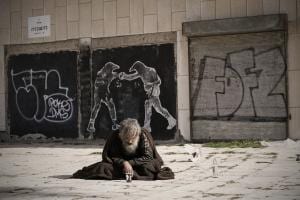
Not only is homelessness a major crisis, it is not getting better, but only worse. Sadly, many of our leaders do not care about the people affected by extreme poverty. If they care, it is only to find a way in which the homeless can be hid from the public, to make them disappear. There is no concern as to making sure the homeless are treated with the dignity and respect everyone deserves, nor is there any significant investigation as to finding the root causes of homelessness so as to deal with the problem in a way which can benefit the whole of society. This is especially what we see coming from Trump in the way he treats the homeless: not only are they being used as pawns in his personal vendetta against California, he has made it clear that he what he cares about is the homelessness affects business interests. To be sure, Trump did not originate such a way to view homelessness, but rather, he can be seen as one of its most aggressive perpetrators of it due to his presidential authority. Even before he became president, there have been many cities doing all they can do to hinder the homeless, from making it difficult if not impossible for them to find places to rest, to making it impossible for them to look for aid, such as those cities and states which create draconian laws and regulations against panhandling.
The Christian response must always be the response of Christ. The Son of God emptied himself of all divine glory to become man, and in doing so, he joined himself in solidarity with us by becoming one with the poor. “And Christ receives from the world, not by any means those who are honored by it or valued among men, but rather he receives as many that are considered of low estate among them and those of less repute.”[1] When he indicated that the Son of Man had no place to lay his head (cf. 9:58), he indicated that he had joined himself with the homeless. Likewise, he made it clear that how we treat the most disadvantaged in society is how we treat him (cf. Matt. 25: 40). He society to change, to be concerned with those in need. He came to proclaim the good news to the poor, but he did so warning the rich and mighty:
But woe to you that are rich, for you have received your consolation. Woe to you that are full now, for you shall hunger. Woe to you that laugh now, for you shall mourn and weep (Lk. 6:24-5 RSV).
The reason why the church proclaims the preferential option for the poor, and thinks it is the duty of the church to take care of and treat the poor, is simply the fact that it is following what Jesus himself had said. Social Justice is rooted to his very mission. Those who decry it, questioning what it has to do with the Christian faith have entirely ignored Jesus and his own example to us. Those who say we should be concerned about the state of our souls, instead of taking care of the earth and all that lives on it, including and especially the poor, would have to denounce Jesus whose ministry was to go to those in need, healing them in body as well as in soul. Jesus did not question the poor and needy as to why they were needy: he told us to take care of them without any reservation. Those who seek to denigrate the poor, to excuse their neglect for the poor by placing the blame of their poverty on the actions of the poor are just creating excuses for why they think they do not have to follow Christ’s teachings. We should listen to what he told us in the Parable of the Banquet (cf. Lk. 14:15-23): the poor and needy will be called into the kingdom of God when those who say they follow God find all kinds of personal excuses to neglect following Jesus into it. The first, those who think of themselves to be the greatest, shall be last, and those they denigrate shall be first. The Gospel requires us to divest ourselves of all supposed self-made glory. The poor and needy who go around asking for help, even though they know they will be abused (and possibly threatened by the law) have already come to realize the poverty in spirit which the rich, in their supposed glory, cannot appreciate.
When priests, alas, give way and promote the rich at the expense of the poor, when they reject the decrees of social justice, when they give aid to and support the exploiters who destroy the earth, they will find that Jesus will judge them that much more harshly because they have taken on the mantle of a person with ecclesial authority while using it to reject his moral expectations. “Let not many of you become teachers, my brethren, for you know that we who teach shall be judged with greater strictness” (Jas. 3:1 RSV). Thus, as St. Isidore of Seville indicated, good and holy priests, good and holy bishops, will stand up for the poor and be their benefactors and defenders, instead of defending those who exploit those in need:
When the poor are oppressed by their rulers, good priests [bishops] – in order to deliver them from this – offer them the help of their protection and they do not fear the hostility of any of their enemies. Rather, they openly confront the oppressors of the poor, they reproach them, they excommunicate them, and they have little fear of their plots to harm them even if they are able to harm them: “The good shepherd lays down his life for the sheep” (John 10:11). [2]
Those who take handouts from the rich with an expectation to protect the rich, those who play defense for policies which harm the poor, who indeed, think nothing of the poor because they have been made rich from their benefactors, are not good shepherd. Rather, they have shown themselves to be mercenaries willing to sell out their flock. Bishops who market themselves to the rich and powerful, giving charming speeches that do everything to encourage those who promote structures of sin, are not fit examples of Christian leadership. They might hide their shallow spirituality with a camera lens, but Jesus, and those who follow him, will not be fooled, nor detoured: they will cry out, revealing the evil which is being promoted. But will such authorities listen? Sadly, as St. Salvian knew, they will not; people are easily seduced by accolades, while they have a difficult time listening to the reproof which they need to hear:
In a way, all wish to be praised. Reproof is pleasing to nobody. What is much worse, no matter how bad, no matter how depraved a man, he prefers to be lauded in a lying manner than reproved in a right manner. He prefers to be deceived by the mockery of false praise, rather than made whole by the most healthful advice.[3]
We will always have the poor with us. This does not get us off the hook. We must not ignore them. We must remember when we see them, we see those who Jesus joined himself and his mission to be with, those who were central to Jesus’ own ministry. We must also remember, but for the grace of God, but for the good fortune which have followed us in our lives, we could easily be among the poor and needy. That we are not homeless on the streets now does not mean we will not be in the future; when policies promote the rich over everyone else, more and more of us will find ourselves impoverished, and then homeless. If we cannot care for them because of the dignity they deserve, we should at least care for the causes and conditions which make for people to suffer such a terrible fate, to make sure those causes and conditions are not increased but rather, rectified, so we ourselves do not find ourselves facing the same fate as those we neglect. While such a selfish reason for our actions should not be seen as virtuous, it should be enough to convince even those who are not so virtuous to act in such a way that will help those in need. And maybe, just maybe, when we look to those we have otherwise tried to hide from our sights, we might slowly find our hearts changed, and we will act, not just out of selfishness, but out of true concern. But this will not happen if we allow those, like Trump, to find ways to hide the poor from our vision. The more we let them be hidden away, the more the rich can and will get away with their unjust exploitation of society. That is why they want the poor, the homeless to be hidden (without, of course, doing anything to truly help them).
[1] St. Cyril of Alexandria, Glaphyra on the Pentateuch. Volume I: Genesis. Trans. Nicholas P. Lunn (Washington, DC: CUA Press, 2018), 232.
[2] St. Isidore of Seville, Sententiae. Trans. Thomas L. Knoebel (New York: Newman Press, 2018), 195.
[3] Salvian the Presbyter, “The Governance of God” in The Writings of Salvian the Presbyter. Trans. Jeremiah F. O’Sullivan (Washington, DC: CUA Press, 1962), 224.
Stay in touch! Like A Little Bit of Nothing on Facebook.
If you liked what you read, please consider sharing it with your friends and family!













